Symposium Monday 21st October
GCU London, Fashion St, Spitalfields.
On a wet and blustery day this October, Glasgow Caledonian’s London campus welcomed a flock of health economists, bioethicists, political scientists, sociologists, philosophers, public health and policy experts, gathered together to debate a particularly intractable problem: how to make health policy that takes account of people’s values when people often disagree – especially on questions of value.

The symposium was made possible with support from The Wellcome Trust. Four papers were pre-circulated and discussants presented their thoughts. Authors were given some time to respond before discussion was opened out to the room. The format was complemented with short talks by early career researchers. Reflections from some more experienced voices closed the day.
In the first session, Benedict Rumbold (Nottingham) discussed Lucy Frith’s (Liverpool) paper: ‘The limits of democracy in priority setting: critical reflections’. In the paper, Lucy analysed the various ways in which democracy has been used to defend and inform public input in health decision making. The paper set out various justifications for involving the public in priority setting decisions and various democratic models that might be employed, focusing in particular on forms of ‘deliberative democracy’. It finished with five key questions: What do we mean by priority setting? What levels of decision making are we addressing? What types of decisions should seek public values? What are the aims of soliciting public values? And who do we want to engage? In response, Benedict suggested that truly democratic decision-making may be rarer than we normally think: one necessary condition being that decisions are made collectively, as a group. In Benedict’s view, therefore, not every effort to solicit public input could really classified as part of a democratic decision-making process. But this had advantages as well as disadvantages: non-democratic decision-making might lack the cache of being democratic but it also doesn’t need to reach the same standards of equality between participants.

From the purely theory to the resolutely empirical, next up was a paper by Kat Smith (Strathclyde): ‘How do public, researcher and policymaker perspectives on health inequalities compare? A mixed methods study involving interviews, a survey and citizens’ juries’. Vickie Charlton (Kings College London) led the discussion, posing questions about plurality in relation to health inequalities – perhaps there is more disagreement over health care priority setting and more agreement in relation to social determinants of health? In relation to NICE appraisal committees, the consideration of facts is appropriately served by expert committees but it is less clear why they would be a legitimate body to judge or represent public values. It would be interesting to compare judgements made by a lay committee with an appraisal committee, and whether the same views would emerge in different contexts.
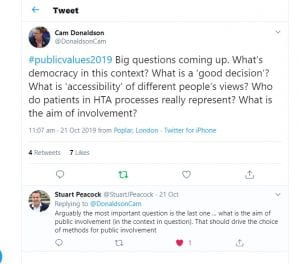
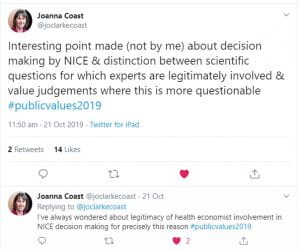
The ‘lightning talks’ session, chaired by Job van Exel (Erasmus, Rotterdam) opened with developing ideas from Neil McHugh (GCU) who has a discretionary award from the Wellcome Trust and is using that time to explore questions about policy, politics and windows of opportunity for upstream policies addressing the social determinants of health. Katie Hirono (Edinburgh) followed with a presentation of doctoral work in progress comparing the possibilities for community participation within citizens’ juries and Health Impact Assessment in Australia and the UK.
In a second mixed methods empirical paper, Jennifer Whitty (UEA) provided much material for discussion in a comparison of a discrete choice survey and two citizens’ juries in Australia, considering provision of bariatric surgery and prioritisation criteria. Helen Mason (GCU) discussed the paper, which focussed on whether information and deliberation changed preferences, beginning with some welfare economics principles about preferences (i.e. that preferences are informed and stable) and raising questions about the concept of conviction in the paper. Overall the paper found information and deliberation made little impact on prioritisation criteria in this context, leading to a provocative suggestion that discrete choice surveys, being a more efficient means of garnering preferences, might be sufficient – on instrumental reasoning. The authors conclude by recommending a mixed methods, sequential approach involving a citizens’ jury (refining the prioritisation and attribute selection) followed by discrete choice survey, followed by further deliberation, reconvening the jury – although this is a resource intensive proposal.
The final paper session was led by Ellen Stewart (Edinburgh) discussing a paper by Rachel Baker and GCU colleagues that proposed an empirical framework that might be used to bring together aggregative and deliberative approaches and to better understand the patterns in public values such that policymakers might be better informed about areas of consensus or disagreement, and consistency between public values expressed at the level of principles policies or choices. Ellen asked whether we should seek to deliver consensus within research and posed key questions about the role of the researcher in all of this. If public values are plural is it our role to do the political work – and resolve plurality into policy recommendation – or should that work be done by people with clear lines of accountability? Turning to the elicitation of public values we debated whether people can and should be required to give reasons for their values or choices; how the paper sets up the ‘who’ in terms of publics, patients or simply ‘people’; and what a citizens’ perspective means. What are the political implications of asking people to set aside personal experiences and make reasoned judgements behind a ‘veil of ignorance’?
In a final session Annette Rid (NIH), Peter Littlejohns (Kings College London) and Cam Donaldson (GCU) reflected on the issues raised across the day from different perspectives. Annette, a bioethicist, noted that there had been little discussion of Accountability for Reasonableness and that A4R is not only about process for resolving disagreement but involves more substantive requirements, such as relevance and focussing only on reasonable disagreement. The symposium papers covered democratic/intrinsic justifications and technocratic/instrumental motivations for public involvement but there is still work to be done on conceptual matters. Public involvement is resource intensive, so when is deliberation needed? And when might representative, aggregative approaches be sufficient?
Peter Littlejohns drew on a wealth of experience as a clinician, decision maker and a pragmatist, through his role at NICE and subsequently as part of a Clinical Commissioning Group. Norman Daniels served as a critical friend to NICE over the years and helped to develop their deliberative processes. Daniels argued that unless NICE involve patients and public in appraisal then it is not truly public involvement. Public deliberation might be seen as an end in itself in that there is inherent value in the process, but what impact does it have? On outcomes? On processes? On structures?
Cam Donaldson reflected on his background as a health economist whose work focusses on managing scarcity and not taking the numbers too seriously! Thinking about why, what, who and how, the key for economists is concern over use of scarce resources. We returned to questions that Lucy’s paper raised in Session 1: what questions are being asked at what levels in the health system. Thinking forwards there is a lot of common ground, as well as plurality in the room. Cam encouraged us to keep the link between academia and decision making as core. Although many arguments go back several decades, there are changes, and institutionalised ideas (highlighted in Kat Smith’s paper) do change. We should seek improvement and not perfection (quoting David Cohen).
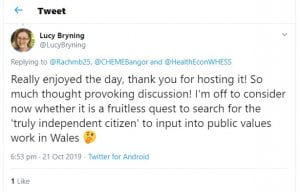
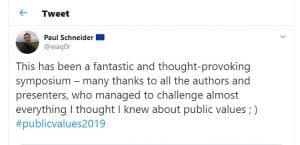
Co-organisers
Rachel Baker (Glasgow Caledonian University)
Lucy Frith (Liverpool University)
Benedict Rumbold (Nottingham University)
Ellen Stewart (Edinburgh University)
Contacts
Rachel.Baker@gcu.ac.uk








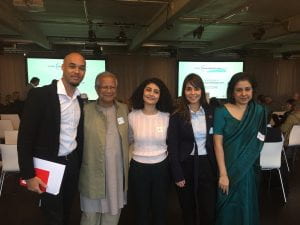




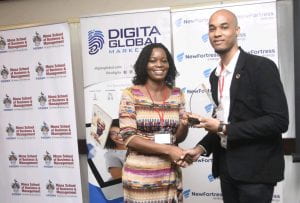
.jpg)